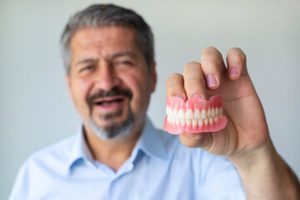
Life would be pretty dull if you couldn’t taste all of your favorite foods! As one of your five primary senses, your sense of taste plays a crucial role in both your enjoyment and quality of life. But unfortunately, your sense of taste will diminish as you grow older. However, did you know that certain dental restorations like dentures can also worsen this reduction? Here’s more from your dentist in Leesburg about the adverse link between dentures and taste and some tips to help you lessen their negative impact.
How Do My Dentures Affect My Sense of Taste?
Needless to say, dentures can offer a lot to patients with missing teeth, and if you have dentures, you’re probably pretty happy with the positive impact they’ve had on your ability to talk, eat, and laugh! But unfortunately, these prosthetics can negatively impact your taste buds, reducing their ability to taste what they come into contact with. And since your taste buds directly influence what you eat, you might lose interest in cooking if you can’t taste all of your favorite foods. In turn, this can severely hurt your overall nutrition!
A denture that covers the upper palate is very likely to result in some reduction or even total loss of taste, due to the role that the palate plays in both taste and smell. Additionally, if your dentures aren’t kept clean, residual food particles can build up on their surface and leave behind a foul taste in your mouth that interferes with how you taste foods. This is quite common with cheaper dentures, since the lower-quality materials are often more porous and easily pick up odors and tastes. Patients who use too much denture cream to secure their dentures might also experience an impacted sense of taste.
How Can I Minimize the Impact of My Dentures?
Fortunately, there are several things you can do to lessen the impact that your dentures have on your sense of taste. Consider the following:
- Keep your dentures clean – If you keep your dentures sanitary, they’re less likely to become stained, dirty, or smelly, meaning they’re less likely to impact your sense of taste! You might also consider minimizing your use of denture cream—applying too much can also affect your ability to taste food.
- Make sure your dentures fit – There are many consequences of wearing ill-fitting dentures, and diminished taste is just one of them! If your dentures keep slipping and sliding around your mouth, your chewing power will also be negatively impacted, which in turn reduces your overall level of nutrition.
- Consider dental implants – Dental implants or implant-supported dentures are two viable options that can effectively replace your missing teeth but with additional benefits compared to traditional dentures, such as no influence on your sense of taste since they don’t need to cover your upper palate.
If you’re concerned about how your dentures might be influencing your sense of taste, don’t hesitate to speak with your dentist. Keeping them clean and functional will ensure that they’re able to serve you well without inhibiting your sense of taste!
About the Author
Dr. Jennifer Pham has served the dental needs of the Leesburg community for over a decade! Dr. Pham received her DMD from the Temple University School of Dentistry and is an active member of several professional organizations including the notable American Dental Association and Academy of General Dentistry. If you have any questions about the article or would like to schedule an appointment, you can contact Dr. Pham through her practice’s website or over the phone: (703) 666-3867.
